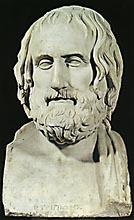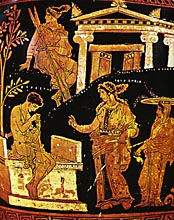

Euripides was born in around 485/484. He belonged to a generation that was familiar with the triumph of the Persian wars from the tales told by their parents. His own parents were from the deme of Phlya (Attica), but the playwright was born on a family estate at Salamis. Playwrights of comedy represented his father as a grocer and his mother as a greengrocer. He is not recorded as having played any part in public life. In 408 he went to the court of king Arkhelaos at Pella, and died there in 406. News of his death reached Athens shortly before the Great Dionysia were due to begin; and it was said that Sophocles turned up to the 'preliminary performance' dressed in mourning, and had the chorus and actors perform without their coronets. A cenotaph in honour of Euripides was set up on the Piraeus road. |
 |
Nineteen of Euripides' approximately ninety plays have survived. (One, the Rhesus, is now thought not to be genuine). In contrast to the other two tragic playwrights, he won first prize on only four occasions during his lifetime (and once posthumously). Yet he was the favourite of later generations, which is why more papyri with texts from Euripides have survived than from the other two writers of tragedy.
Like other tragic playwrights, Euripides set his own stamp on his work, introducing personal idioms and innovations. Typical was the prologue in the form of a monologue, serving to orient the viewer to the antecedents of the action, and to indicate what liberties the playwright was about to take with the myth. Euripides laid particular emphasis on the verbal skirmishing (agon) which enlivened corresponding scenes in lawcourts. A fundamental innovation was the use of the deus ex machina: the deity who appears on high and provides the solution to the tragedy.
 |
Euripides was creating his plays amid the chaos brought on by Athenian policy during the Peloponnesian war. As a sharp-eyed observer and a citizen with an affection for his city, he was critical of political action throughout the war. He found that it would lead to the downfall of the people responsible for it - Athens, in other words - inasmuch as the city as an active object went beyond all the ethical canons. In the last stages of the war, the playwright found that the whole Athenian system - the polis - was tottering. Each person was under some compulsion, resulting in a mode of action that led to greater disorder. Amid the disorder of his times, Euripides grasped at the principle of "Man, the Measure of All Things", in all its manifestations, giving it shape in his tragedies. Plays of his such as Medea and Hecuba demonstrate that tragedy was beginning to lose its transgressive functionalism. These two tragedies develop a critique on existing practices, without offering any alternative solution. This problem was not to be overcome until the appearance of philosophy, whose target was political and moral activity and whose quest was for principles higher than those in force in the polis, namely the replacement of the transgressive by the transcendental. |
 |
 |
|
| |
|||
| |||